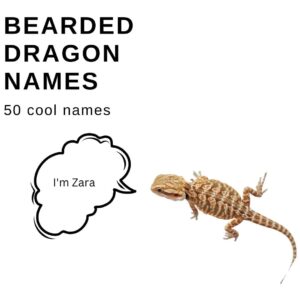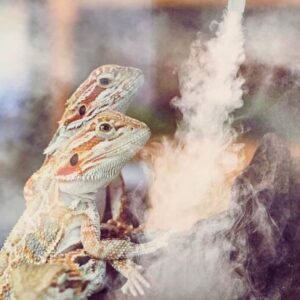If you accidentally fed your birdie mushroom, the short answer is NO, and you should contact your vet ASAP.
If you want to understand if bearded dragons can eat mushrooms, read along as I will include reasons why mushrooms should be off the plate, symptoms of mushroom poisoning, and what to do if your bearded dragon accidentally eats mushrooms.
Let’s get to it.
Can A Bearded Dragon Eat Mushrooms?
No. Bearded dragons’ digestive systems are not designed to process the chitinous structure of mushrooms, and there is a real risk of toxicity from certain mushroom species. It is best to stick to a diet that aligns with their natural dietary preferences: insects, leafy greens, and occasional fruits.
Can A Bearded Dragon Eat Mushrooms: Table of Contents
Reasons Why Birdies Should NOT eat mushrooms
Oxalates and oxalic acid in mushrooms can negatively affect bearded dragons by interfering with calcium metabolism and potentially leading to kidney issues.
Mushroom poisoning can be life-threatening, and the calcium-to-phosphorus ratio in mushrooms can cause some skeletal issues.
Oxalates and Oxalic Acid
Oxalates and oxalic acid are naturally occurring compounds in some plant and fungal species, including mushrooms. While these substances may not harm humans, they can be problematic for bearded dragons due to their unique physiology.
Oxalates and Calcium Binding
One of the most significant concerns related to oxalates and oxalic acid is their ability to bind with calcium. Like all reptiles, bearded dragons require an adequate supply of calcium for skeletal health and other physiological processes. Calcium is vital for maintaining strong bones, muscle contractions, and blood clotting.
When bearded dragons ingest foods containing high levels of oxalates, such as certain mushrooms, oxalates can bind with calcium in the reptile’s body, forming calcium oxalate crystals.
These crystals can accumulate in organs, most likely the kidneys.
The Kidney Conundrum
Bearded dragons possess relatively small and delicate kidneys compared to their body size. These organs play a crucial role in filtering waste products from the bloodstream and regulating water and electrolyte balance. The formation of calcium oxalate crystals in the kidneys can lead to several detrimental effects:
Kidney Stones: The accumulation of calcium oxalate crystals can result in the formation of kidney stones. These stones can obstruct the urinary tract, causing pain, discomfort, and difficulty passing urine.
Renal Damage: The presence of these crystals can lead to renal damage over time, impairing the kidney’s ability to function correctly. This can result in kidney disease, a severe and often irreversible condition.
Avoid Oxalate-Heavy Foods
Given the potential harm that oxalates and oxalic acid can inflict on bearded dragons, be vigilant about their diet. While some mushrooms contain higher levels of these compounds than others, it’s best to avoid mushrooms altogether as a precautionary measure.
Mushroom Poisoning
The toxic compounds found in certain mushrooms can lead to a range of adverse effects.
Symptoms of Mushroom Poisoning in Bearded Dragons
- Gastrointestinal Distress: One of the initial signs of mushroom poisoning in bearded dragons is gastrointestinal distress. This can manifest as:
-vomiting,
-diarrhea
-regurgitation.
These symptoms indicate the reptile’s body attempts to eliminate the toxic substances.
- Neurological Symptoms: Some toxic mushrooms can affect the nervous system, leading to neurological symptoms:
- tremors,
- muscle weakness,
- even seizures.
Neurological symptoms can be particularly alarming and require immediate attention.
- Lethargy and Weakness: Bearded dragons suffering from mushroom poisoning often become lethargic and weak. They may appear sluggish and unresponsive to their surroundings.
- Loss of Appetite: A sudden loss of appetite is a common symptom of mushroom poisoning. Bearded dragons may refuse to eat or show disinterest in their usual food, which can lead to rapid weight loss.
- Jaundice: In some cases, mushroom poisoning can lead to jaundice, a yellowing of the skin and eyes. Jaundice is a sign of liver dysfunction and typically indicates a severe toxic reaction.
- Respiratory Distress: In advanced cases of mushroom poisoning, bearded dragons may experience difficulty breathing, which can be a life-threatening symptom. This may manifest as open-mouth breathing or labored breathing.
- Dehydration: Mushroom poisoning can cause dehydration due to vomiting and diarrhea. Dehydrated bearded dragons may have sunken eyes, dry skin, and lethargy.
Mushroom poisoning can progress rapidly, and early intervention is crucial for the reptile’s chances of recovery. While there is no specific antidote for mushroom toxicity, supportive care provided by a veterinarian can significantly affect the outcome.
Calcium to Phosphorus Ratio
Mushrooms are generally low in calcium and high in phosphorus. This skewed ratio can have adverse effects.
Adverse Effects of a High Phosphorus Intake
- Calcium Deficiency: A diet high in phosphorus and low in calcium can lead to calcium deficiency, a condition known as hypocalcemia. Bearded dragons with calcium deficiency may suffer from weakened bones, muscle tremors, and even seizures.
- Resorption of calcium from bones: This weakens the skeletal structure over time.
- Metabolic Bone Disease (MBD): A long-term imbalance can result in metabolic bone disease, a severe and often irreversible condition characterized by deformities, fractures, and severe pain.
What to do if your beardie ate a mushroom
Mushroom poisoning can be life-threatening for bearded dragons; early intervention is crucial. Always consult a qualified reptile veterinarian for the most accurate and timely advice regarding your pet’s health. Your veterinarian will be the best source of guidance for your specific situation.
- Identify the Mushroom: Knowing the type of mushroom can help a veterinarian provide better guidance.
- Do Not Wait: Time is of the essence when dealing with potential mushroom poisoning. Do not wait for symptoms to appear. Seek immediate veterinary attention, especially if you are unsure about the type of mushroom your bearded dragon consumed.
- Do Not Induce Vomiting: Unlike some other animals, it is not recommended to induce vomiting in reptiles like bearded dragons. This can be stressful for the reptile and may not effectively remove the toxins.
- Contact a Reptile Veterinarian: Locate a veterinarian experienced in reptile care and call them immediately. Explain the situation, including the type of mushroom and symptoms.
- Gather Information: Be prepared to provide additional information, such as your bearded dragon’s age, weight, and pre-existing health conditions. This information will help the veterinarian assess the situation more effectively.
- Follow Veterinary Guidance: They may recommend treatments such as administering fluids, supportive care, or other measures based on the severity of the situation.
- Monitor for Symptoms: Even after veterinary treatment, closely monitor your bearded dragon for any symptoms of mushroom poisoning, such as gastrointestinal distress, neurological symptoms, lethargy, or respiratory issues. Report any changes to your veterinarian.
My Senior Paws is a participant in the Amazon Services LLC Associates Program, an affiliate advertising program designed to provide a means for sites to earn advertising fees by advertising and linking to Amazon.com. We also participate in other affiliate programs which compensate us for referring traffic.




